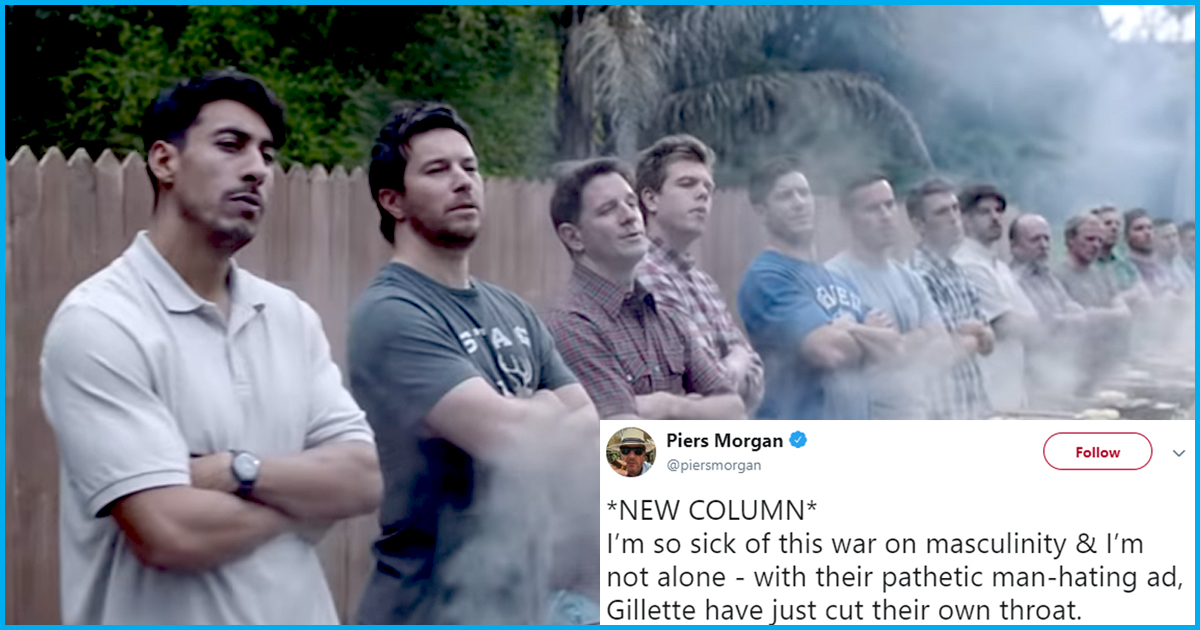
Gillette Ad Sparks Outrage Among Men-Is This The Best A Man Can Get?
17 Jan 2019 5:27 AM GMT
Editor : Sromona Bhattacharyya
Hailing from Kolkata and now a resident of Bengaluru, Sromona is a multimedia journalist who has a knack for digging stories that truly deserve attention.
A new ad film, titled “We Believe” by shaving company Gillette has taken the internet and the netizens by storm. The video which lasts for a minute and a half directly attacks the culture of “toxic masculinity” while brushing on topics like sexual harassment, the #MeToo movement, sexism, bullying and violence.
What is the Gillette ad?
Gillette, in an attempt to change the “Men, will be men” narrative, tweaked its 30-year-old tagline — The Best A Man Can Get — and asked, “Is this the best a man can get?” Within moments of the video being uploaded on January 14, it went viral and caught the attention of people. The video at the time of writing this article had racked up close to 10 million views on YouTube.
The video begins with various news reports of the #MeToo movement and then gradually goes on to depict sexism in films, apparent playful violence among boys, harassment in the workplace, mansplaining, catcalling with the hint of the “Boys will be boys” narrative. However, the latter part of the 1:50 minute-long video shows men challenging the catcallers, breaking up fights and empowering their daughters. It challenges the viewers to let go of the same excuses and take on the issue of toxic masculinity, The ad asks, “Is this the best a man can get?”
While this is not the first time that Procter & Gamble, Gillette’s parent company, has made use of progressing themes in their product marketing, this particular ad struck a new chord among men and even women. The video has drawn praise from the likes of actress Rosanna Arquette and Arianna Huffington among others, however, instead of being inspired by this positive ad film, many men and even some women have expressed their outrage.
Outrage on social media
The rage on social media started with many men declaring that they are going to stop using the product and the battalion of such individuals was probably led by renowned journalist and television presenter Piers Morgan.
*NEW COLUMN*
I’m so sick of this war on masculinity & I’m not alone – with their pathetic man-hating ad, Gillette have just cut their own throat.https://t.co/QguI8YLZL8 pic.twitter.com/OUP3SwcEZg— Piers Morgan (@piersmorgan) January 15, 2019
@Gillette has made it clear they do not want the business of masculine men.
I will grant their wish.
I have used #Gillette razors since they sent me a free sample on my 18th birthday, and will no longer buy any of their products.
— Rule The Wasteland (@MongoAggression) January 14, 2019
I am taking action. I'm researching every product made by Proctor & Gamble, throwing any I have in the trash, and never buying any of them again until everyone involved in this ad from top to bottom is fired and the company issues a public apology.
— Joe (@JoeS3678) January 14, 2019
Jeffrey Reddick, creator of the Final Destination horror franchise took a dig at Morgans’ commentary on the ad film and took to Twitter to write, “Toxic masculinity is when we teach boys that real men don’t cry. Real men don’t show fear. Real men don’t lose. Real men take what they want. Real men solve problems with their fists. It is toxic and it damages men and women.” Of course, the conversation did not end there.
Hi Jeffrey. Fine words!!
Do ‘real men’ make millions of dollars from movies glorifying the slashing, stabbing, shooting, incineration, strangulation & dismemberment of women? https://t.co/uITmS0Chc3— Piers Morgan (@piersmorgan) January 15, 2019
Hey Piers. Nice try. But none of the horror movies I’ve written glorify violence against women. I’ve never even written a nude scene. They’re all supernatural thrillers, except for one zombie movie. And the zombies ate more men than women. https://t.co/bmWXB0xgrD
— Jeffrey Reddick (@JeffreyaReddick) January 15, 2019
Many other men also echoed the same emotions as Piers and called for boycotting the company and even asked the makers of the ad to apologise publicly. A number of men and women have also suggested that not all men fall prey to toxic masculinity and that not every man sexually harasses women and the likes.
This Gillette ad is nothing more than feminist left wing propaganda to demonize all men & masculinity. For every one man that does bad, there are thousands more that sacrifice & do good. You always hear the bad that men do, but NEVER the good This is why I love conservative women
— Joe197 (@mdx3232) January 15, 2019
While an individual (read man) might not partake in sexism, misogyny and downright violence, this does not exempt them from the conversation surrounding toxic masculinity or even in a video which is asking men to simply, behave. According to an article in ABC, toxic masculinity has become a term describing male feelings of entitlement, anger and vulnerability among others and it started gaining popularity in late 2017 after cases of sexual harassment and misconduct started coming to the fore. “The awake masculine sees that we are all connected and a part of a toxic system and must become part of the solution,” reads an article in Psychology Today.
The Logical Indian Take
This ad film is a progressive one which rides on the tide of “bad masculinity” to show the world that every individual has the responsibility to rectify the current scenario in order to build a better tomorrow. However, some of the comments on the ad left by internet users show exactly why we need more ad films like these. Why boycott Gillette for an ad that asks men to be more human. Is the male ego so fragile that they cannot handle positive and constructive criticism?
A person who is already an advocate of equality and mutual respect should not in any way be threatened by an ad like this, which simply takes the idea of quashing “toxic masculinity” further. The idea that men should be a certain way or appear masculine and dominant has somewhere put immense pressure on men. Living in a hetero-normative world means that there are certain expectations that lie on “masculinity” and this has repercussions as well. The American Psychological Association guidelines reveal that fearful masculinity inflicts harm on both men and women. The onus lies on all of us to embrace the problems that plague the society today, acknowledge and rectify it in order to build a better and a more equal tomorrow.
Also Read: ‘Twitter Is Anti-Hindu, Hindus Are In Danger,’ Jack Dorsey’s Picture Scares Nationalists
 All section
All section













